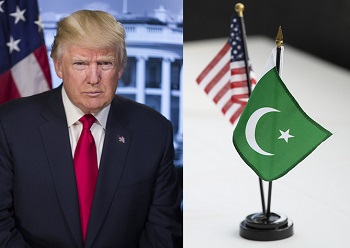Pakistan Backs Trump Fast-Tracking US-Taliban Talks
 Michael Hughes
Michael Hughes
February 2, 2019
The opposing sides of the ethno-nationalist conflict in Northern Ireland had engaged in talks for more than 15 years before reaching a historic peace settlement in 1998. Contrast this with the prospect that – within six days – an Afghan-turned-neoconservative cowboy and a group of Pakistani-backed radical Islamist insurgents negotiated a “framework agreement” that could end the 17-year war in Afghanistan. It is reasonable for one to meet these allegations with a heavy dose of skepticism – if not outright disbelief – and yet in many ways it all makes perfect sense.
So far the deal looks horrible for the long-term stability of Afghanistan. The United States appears willing to withdraw troops and hand over a significant amount of political power to the Taliban in exchange for lip service that the insurgents will not allow terrorists to plan attacks on the West.
Meanwhile, the Afghan government seems entirely irrelevant in this process. The Trump administration is more than willing to backstab its puppet in Kabul all in the name of the deal. And this deal must happen because the obstinate tycoon reality television star that is currently occupying the White House simply wants to deliver on a campaign promise.
In fact, President Donald Trump is only looking for a mere semblance of a peace deal to justify an exit that he can package and sell to his base. It will allow him to boast of extirpating the United States from a costly overseas military excursion.
However, Trump also desperately needs enough window dressing to make sure it does not look like he simply surrendered to the Taliban – the entity he once guaranteed the United States would defeat.
Trump the dealmaker’s calculus is simple. He will not be persuaded by detractors who argue that the United States cannot just leave because Americans have invested too much money and spilt too much blood. Trump sees it as a bad investment. He is willing to cut his losses and wants to avoid throwing good money after bad.
One could even argue that Trump is being a realist. In truth, the United States has lost its proxy war against Pakistan. Islamabad’s pawns have predictably outlasted the Western superpower as the Viet Cong did more than four decades ago.
Trump knows he is powerless without the aid of Pakistan which has always had veto power over any arrangement dealing with the future of Afghanistan. Given that the talks have not been undermined by an ISI-orchestrated attack in Kabul, one can rest assured that the negotiations are headed towards an end game that is well aligned with Pakistani state interests.
Islamabad has not only allowed the Taliban to negotiate, they have forced the insurgents to sit down with the Americans and the Afghan government. In mid-January, Taliban officials complained that the arrest of a senior leader illustrated a push by Islamabad to pressure the insurgents to open talks with Kabul.
Not too long ago Trump was threatening Pakistan in Twitter rants for not cracking down on terrorist havens. He even suspended around $1 billion in foreign assistance. The president has changed his tune dramatically in a very short period of time.
Prime Minister Imran Khan since receiving a letter from Trump in December has bragged how his country facilitated the talks between the Americans and the Taliban. Pakistani Foreign Ministry Spokesperson Mohammad Faisal even suggested that Trump is – suddenly – pleased with the country’s efforts to crack down on terrorism.
“Today, our role for stabilizing the region is being acknowledged by the U.S. leadership including President Trump,” Faisal said during a briefing on January 31.
Pakistan indeed envisions many benefits from this thaw in relations, including a possible resumption in foreign assistance along with prestige. Former Indian diplomat M.K. Bhadrakumar summed up a few of the key motives driving Pakistan’s facilitation of the talks.
“The crucial thing in all this is that Pakistan is convinced about firstly, the US intention to withdraw forces from Afghanistan; secondly, Washington’s receptiveness to revive the relationship with Pakistan; thirdly, Islamabad’s awareness that continued engagement of the international community with post-conflict Afghanistan is necessary; and emanating out of the above, the realization that a broad-based, inclusive government in Kabul will be in Pakistan’s interest, too,” Bhadrakumar said in an article for Asia Times on January 31.
However, perhaps our friend is being a bit too diplomatic about Pakistan’s true interests. Because we cannot ignore the biggest motivating factor here.
Since Pakistan was founded in 1947 it has attempted to control Afghanistan for strategic depth purposes vis-à-vis its conflict with India over Kashmir. Now Islamabad’s Taliban pawns are on the verge of getting reinserted into positions of power in Kabul. To put it bluntly – the Pakistanis could care less if Afghanistan’s government is “inclusive” so long as it “includes” the strategic assets they have groomed for decades.
